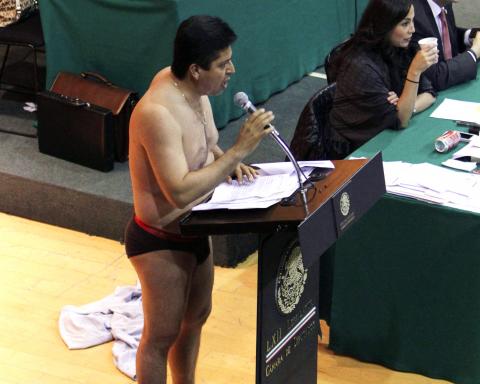Mexico’s Congress approved historic energy reform on Thursday aimed at luring foreign oil firms back into the country and ending the state’s 75-year-old monopoly following a heated debate.
After a marathon session that lasted nearly 24 hours, the Mexican lower house voted 353 to 134 for the legislation championed by Mexican President Enrique Pena Nieto, one day after it passed the Senate.
Supporters pumped their fists and chanted “Mexico!” after the vote, while leftist opponents shouted “traitors” following a debate during which a couple of lawmakers scuffled and another stripped down to his underwear in discontent.

Photo: Reuters
Pena Nieto welcomed the vote on a “fundamental transformation that will drive economic growth and generate jobs in our country.”
The constitutional changes must now be approved by a majority of 32 state legislatures, with most expected to give their backing.
The legislation is the centerpiece of Pena Nieto’s reform agenda, which has led to overhauls of education, tax collection, banking and telecommunications to boost Latin America’s second-biggest economy.
However, opening the oil and gas industry to private investment is a highly sensitive issue in Mexico, where many look back with pride at the expulsion of foreign companies by former Mexican president Lazaro Cardenas in 1938.
Supporters insist that state-run energy firm Pemex urgently needs outside help to reverse a downward trend in production, build refineries and drill for shale gas and deep-water oil deposits.
The left, led by the Democratic Revolution Party (PRD), had called for a referendum, arguing that the reform amounts to a privatization of the industry and a gift to US companies.
Pena Nieto’s centrist Institutional Revolutionary Party (PRI) joined forces with the conservative opposition National Action Party (PAN) to draft the bill.
“Transforming our energy sector is urgent,” PAN deputy Juan Bueno Torio said.
Oil output has dropped from 3.4 million barrels per day in 2004 to 2.5 million yesterday, and Mexico imports half of the gasoline it consumes.
The reform would let private firms explore and extract oil and gas, as well as share profits, production and risk with Pemex, ending a ban cemented in Mexico’s constitution. The reform, however, says the oil will remain the property of the country.
Although it falls short of more controversial concessions, analysts say the reform’s contracts and license schemes are more ambitious than Pena Nieto’s original proposal, which had called for profit-sharing deals.
Pete Garcia, executive director of the Gulf Goast chapter of the US-Mexico Chamber of Commerce, said energy firms will meet in Texas next month to discuss the reform’s potential.
“It is the hot topic,” Garcia told reporters.
“Mexico has such vast reserves that have not been tapped that [the reform] would only be positive for our communities in Houston,” he said, referring to the Texas energy hub.
However, Garcia and analysts warned it would take time for the reform to bear fruit.
“It will take several years for the actual refineries that need to be built in Mexico to be actually built. So that means Mexico will still have to send crude to be refined here,” he said.
Lawmakers voted one by one by voice following a rowdy session held in a crammed auditorium because two-dozen leftist lawmakers had padlocked themselves inside the 500-seat chamber of deputies.
The vote capped a marathon debate in which the majority rejected a series of objections raised by the left, which was angry that the reform was fast-tracked by skipping committees.
The session took an unusual turn when PRD deputy Antonio Garcia Conejo took to the podium before dawn and removed his socks, suit and tie.
Standing in his black underwear, he said supporters of the reform “stripped down the nation.”
Two other lawmakers, leftist Karen Quiroga and PRI deputy Landy Berzunza, scuffled during the session, leaving Berzunza with a scratched retina.
The vote broke an unprecedented accord between the PRI, PAN and PRD that had led to the passage of political, education, fiscal, telecoms and banking reforms.
“The Pact for Mexico is dead,” PRD president Jesus Zambrano told reporters.
He said his party will send a letter to international oil companies, warning them that the left will demand a referendum in 2015 to repeal the reform.

FOREST SITE: A rescue helicopter spotted the burning fuselage of the plane in a forested area, with rescue personnel saying they saw no evidence of survivors A passenger plane carrying nearly 50 people crashed yesterday in a remote spot in Russia’s far eastern region of Amur, with no immediate signs of survivors, authorities said. The aircraft, a twin-propeller Antonov-24 operated by Angara Airlines, was headed to the town of Tynda from the city of Blagoveshchensk when it disappeared from radar at about 1pm. A rescue helicopter later spotted the burning fuselage of the plane on a forested mountain slope about 16km from Tynda. Videos published by Russian investigators showed what appeared to be columns of smoke billowing from the wreckage of the plane in a dense, forested area. Rescuers in

Philippine President Ferdinand Marcos Jr is to meet US President Donald Trump this week, hoping Manila’s status as a key Asian ally would secure a more favorable trade deal before the deadline on Friday next week. Marcos would be the first Southeast Asian leader to meet Trump in his second term. Trump has already struck trade deals with two of Manila’s regional partners, Vietnam and Indonesia, driving tough bargains in trade talks even with close allies that Washington needs to keep onside in its strategic rivalry with China. “I expect our discussions to focus on security and defense, of course, but also

POINTING FINGERS: The two countries have accused each other of firing first, with Bangkok accusing Phnom Penh of targeting civilian infrastructure, including a hospital Thai acting Prime Minister Phumtham Wechayachai yesterday warned that cross-border clashes with Cambodia that have uprooted more than 130,000 people “could develop into war,” as the countries traded deadly strikes for a second day. A long-running border dispute erupted into intense fighting with jets, artillery, tanks and ground troops on Thursday, and the UN Security Council was set to hold an emergency meeting on the crisis yesterday. A steady thump of artillery strikes could be heard from the Cambodian side of the border, where the province of Oddar Meanchey reported that one civilian — a 70-year-old man — had been killed and

‘OPPORTUNITY TO ENGAGE’: Antonio Costa and Ursula von der Leyen are to meet Chinese President Xi Jinping to discuss EU-China relations and geopolitical challenges Top leaders from China and the EU are to hold a summit in Beijing this week, as the major economic powers seek to smooth over disputes ranging from trade to the Ukraine conflict. Beijing and Brussels have been gearing up to mark the 50th anniversary of the establishment of diplomatic ties, but a suite of squabbles over state subsidies, market access and wartime sanctions have dampened the festivities. A spokesperson for the Chinese Ministry of Foreign Affairs yesterday confirmed that European Council President Antonio Costa and European Commission President Ursula von der Leyen would visit on Thursday. The statement came after the EU